News
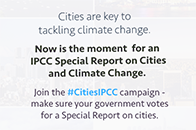 |
Mayors, city networks and urban stakeholders worldwide call for an IPCC Special Report on Cities and Climate Change Cities are already facing the impacts of climate change and are highly vulnerable to a range of climate hazards, including sea level rise, street flooding, landslides, droughts, epidemics and severe heat waves, which threaten the heath, well-being and livelihood of citizens. Cities are integral to fighting climate change; while they are responsible for 37–49% of global GHG emissions, and urban infrastructure accounts for over 70% of global energy use, research shows that urban policy decisions made by 2020 could determine up to a third of the remaining global carbon budget that is not already ‘locked-in’ by past decisions. More information |
 |
Urban SDG and Habitat III safe as marathon negotiations reach consensus A marathon weekend negotiating session reached the finish line on Sunday as 193 U. N. member states reached consensus on the outcome document of the Sustainable Development Goals (SDGs), the framework that will now guide global efforts to combat poverty and promote sustainable development for the next decade and a half.The culmination of this years-long process resulted in several important gains for supporters of a standalone goal on cities — the landmark Goal 11, known as the urban SDG, offering the first-ever international agreement on urban-specific development.More information |
 |
Collaboration agreement to deliver inclusive resilient growth signed by City of Ulaanbaatar and Ecological Sequestration Trust Professor Peter Head CBE, Founder and Chief Executive of The Ecological Sequestration Trust (The Trust) and the Mayor and Governor of Ulaanbaatar, Bat-Üül Erdene have signed a Memorandum of Understanding, in the presence of Prime Minister Chimed Saikhanbileg of Mongolia, to work in partnership delivering smart, resilient and sustainable development for the people of Mongolia.The Trust, a UK charity, has been working in Ulaanbaatar since December 2013, supported by the Foreign and Commonwealth Office (FCO) British Embassy of Mongolia and Future Earth Ltd., to create an integrated, urban-rural, systems data platform called resilience.io. This tool will enable cities to plan and evaluate the business case for investment in projects that support the delivery of the Post-2015 SDGs.The Trust’s approach, detailed in the report, ‘Smart ways to mobilise more efficient and effective long-term investment in city regions‘, will be presented as a way of bringing forward investment in sustainable projects at the Third International Conference on Financing for Development (FfD) in Addis Ababa in July and at the Climate Change Conference of the Parties in Paris in December. Follow the Trust’s activities on Twitter @ecosequestrust |
 |
Aromar Revi Delivers Keynote Address to UN Habitat Governing Council Aromar Revi, Director of the Indian Institute for Human Settlements, delivered the keynote address at the 25th session of the UN-Habitat Governing Council. In Nairobi, Revi warned that the “world is deeply unprepared” to implement the Sustainable Development Goals (SDGs) – largely expected to be adopted by the UN General Assembly this September. He cautioned that nations and cities will be severely challenged to integrate and achieve sustainable development within current frameworks. To achieve, Revi acknowledged that the world will need new global and local partnerships, new governance and fiscal arrangements and increased multi-stakeholder knowledge and capacity. Cities are uniquely situated to address some of these arrangements and Revi offered six key messages: 1) cities and regions are vital for successful SDG implementation; 2) Goal 11- the Urban SDG, is a powerful integrating opportunity; 3) financing for development (Ffd) will need to be localized; 4) local governments and communities need to included and recognized at September’s SDG Summit; 5) cities will be the front runners of implementation; and 6) geospatial monitoring and evaluation techniques are needed. Although we can almost live with Goal 11 as the OWG proposed, namely “making cities and human settlements inclusive, safe, resilient, and sustainable”, Revi argued that they must also be productive where all citizens have access to meaningful jobs and reliable public goods and services. Click here to link to video and Citiscope coverage. |
 |
Onenyc: New York City Releases New Sustainable Development Plan On 22nd April 2015, Earth Day, Mayor Bill de Blasio released New York city’s new sustainable development strategy OneNYC This strategy builds on past New York sustainability plans established under former Mayor Bloomberg (PlaNYC), but goes further weaving in a strong focus on equity and social justice. The plan presents a roadmap for an integrated urban sustainable development strategy, aligned with the global SDG process. Professor Jeffrey Sachs served as co-chair of the Sustainability Advisory Board, overseeing the plan’s development. Professor Sachs and colleagues at SDSN expect to be deeply involved in supporting the plan’s implementation and roll-out over the months ahead and will endeavor to create platforms to showcase OneNYC as one of the world’s first integrated urban sustainable development strategies, aligned with the global SDGs. |
 |
SDSN Releases “Data for Development: A Needs Assessment for SDG Monitoring and Statistical Capacity Development” The discussion on the Sustainable Development Goals (SDGs) has renewed interest in strengthening the quality and availability of statistics for management, program design and monitoring performance. The Financing for Development Summit in July 2015 presents a crucial opportunity to make the case for increased investments in development data, but to do so the statistical community need agree upon a robust estimate of resource needs. This study, prepared by a broad coalition of data for development experts convened by SDSN, attempts to respond to that challenge. “Data for Development: A Needs Assessment for SDG Monitoring and Statistical Capacity Development” estimates that the IDA-eligible countries will need to spend $1 billion a year to upgrade their statistical systems and carry out regular data collection for the SDGs. Donors must maintain current contributions to statistics, of approximately US$300 million per annum, and go further, leveraging US$100-200 million more in Official Development Assistance (ODA) to support country efforts. For their part, recipient countries must commit to fill the gap, mobilizing domestic resources behind clear national strategies for the development of statistics (NSDSs).Both donors and recipient countries must look to join the data revolution. The unprecedented rate of innovation in data collection techniques and technologies and the capacity to distribute data widely and freely has expanded the horizon of possibility. The adoption of the SDGs presents a strategic opportunity to realize the data revolution and demonstrate the centrality of data for development. Please find the report or policy note here. |
 |
IHS to host open Workshop on Sustainable Development Goal May 20thThe Institute for Housing and Urban Development Studies at Erasmus University Rotterdam will host a meeting of Urban Academics, Experts and Practitioners on May 20th. The meeting aims to gather academics and practitioners on urban matters from across Europe to discuss the old and new challenges for urban capacity development in the context of sustainable global development. Participants will engage in roundtable thematic groups to discuss the implications of SDG Goal 11. The meeting’s theme is “The responsibility of knowing (better)? Research, education and advisory in the light of sustainable urban development”. Discussion questions include: What kind of capacities do we need for our urban future? How will these be developed and on what will these be based? How can we better combine the different aspects of sustainable urban development in our strategies?More information and application can be found here. |
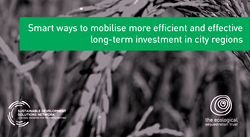 |
Smart ways to mobilise more efficient and effective long-term investment in city regionsThis report outlines methods by which the rapid change of direction and scale up of funds required for improved planetary health and the delivery of the Post-2015 Sustainable Development Goals could be achieved.It provides practical insight, including case studies, into how innovative tools can be used that harness investment, and lead to a better collective understanding of how to deal with climate mitigation and adaptation, the management of global resources within their limits and the restoration of damaged ecosystems that support human resilience.The report was written at a high-level meeting facilitated by The Ecological Sequestration Trust and Future Earth Limited, and hosted by the Rockefeller Foundation‘s Bellagio Centre. Endorsed by the United Cities and Local Governments (UCLG) and the United Nations Sustainable Development Network (UN-SDSN), the report will be presented at a special event on “Mobilising local finance to implement the post-2015 development agenda” organised by the Global Task Force of Local and Regional Governments at the UN Headquarters, New York on the 10th April. It will feed into the Addis Ababa Financing for Development meeting in July.More Information |
 |
High Level meeting on ‘Financing Transformational Change for Planetary HealthThe Rockefeller Bellagio Center and the Ecological Sequestration Trust are hosting a High Level meeting on ‘Financing Transformational Change for Planetary Health’On 25 – 27 February 2015, UrbanSDG campaign members, innovative financiers, public private finance experts and regional governors will be meeting at the prestigious Rockefeller Bellagio Center in Italy. They will discuss how we can use 2015 and the coming of the urban and other SDGs as a launchpad for demonstrating how to draw investment into more sustainable and resilient pathways for human and ecological health through city regions.Attendees will discuss how innovative finance can be practically demonstrated at regional level, founded on a solid scientific and data evidence-base that informs and encourages sustainable outcomes. The resulting short report will feed into the Addis Ababa Financing for Development meeting in July and illustrate how successful holistic delivery of the post 2015 goals can be tackled globally, and benefit from a focus on city regions.Follow the activity on Twitter at #financeforSDGs |
 |
Call for Papers for UPPD 2015, SingaporeA call for papers has been issued for the 2015 Annual International Conference on Urban Planning and Property Development (UPPD) to be held in Singapore this coming October. The conference, organized by the Global Science and Technological Forum “serves as a platform for academics, researchers, scientists, consultants and policy makers to interact and discuss how to improve urban planning and property development in order to enhance the lifestyle of the community. The conference will provide an opportunity for the participants to exchange ideas … in the field of urban planning, urban design, real estate and property development.” Topics range from environmental design to geopolitics. For full details, click here. |
 |
TRB releases Issue on Energy, Climate Change and Alternative FuelsThe US Transportation Research Board has recently released an issue on Energy, Climate Change and Alternative Fuels. The Transportation Research Record includes 13 articles on topics ranging from gasoline consumption in megacities, to China’s travel demand and its impact on a national carbon policy, to Oregon’s 2050 Vision for GHG Emission Reduction. More details can be found here. |
 |
Lincoln Institute of Land Policy to host Strategies for Local Revenue MobilizationLincoln Institute of Land Policy’s program on Latin American and the Caribbean will host a conference and workshop on “Sustainable Strategies for Local Revenue Mobilization: Public and Private Sector Perspectives” to be held in Brazil on March 25-27. The conference is in collaboration with the International Property Tax Institute and the Royal Institution of Chartered Surveyors and will focus on “contemporary funding strategies for metropolitan areas and large cities…the effects of globalization, governance choices and policy innovations, legacy of participatory budget schemes, economies of scale, and feasible funding models”. For more information follow this link. |
 |
Municipal Arts Society to Hold Resilient Cities Webinars
The Municipal Arts Society will hold two resilient city webinars in February. The first, “Evaluating the Resilience of Cities: The Role of Measurements and Indicators” will be held Tuesday, February 10th at 10:00 AM EST (NYC) / 4:00 PM CET (Paris) / 6:00 PM EAT (Nairobi) / 8:30 PM IST (Bangalore). Speakers include Eugenie Birch – UPenn Co-Director for Urban Research and Chair of UN-HABITAT’s World Urban Campaign (Moderator), Eduardo Moreno – Director of Research and Capacity Development, UN-HABITAT, Monica Brezzi – Head of Regional Analysis and Statistics Unit, OECD Directorate for Public Governance and Territorial Development, and Garima Jain – Senior Associate, Indian Institute for Human Settlements. Please register here. The second, “Migration and the Resilient City: Bristol: a Cities of Migration Big Ideas Webinar “, will be held, Tuesday, February 17th at 10:00 AM EST (Toronto, NYC) / 3:00 PM GMT (London, Bristol) / 4:00 PM CET (Berlin, Barcelona). Presenters include: Di Robinson – Service Director, Neighbourhoods and Communities, Bristol City Council, Ian Roderick – Director, The Schumacher Institute, and Mary Rowe – Director, Urban Resilience, Municipal Art Society of New York City. Please register here. |
 |
New Framework for the Gold Standard Sustainable Cities Programme
The Gold Standard Sustainable Cities Programme is seeking comments and input in response to a new framework, through which cities can develop, audit and verify urban programmes in order to catalyse and scale up currently missing investment. The new framework goes beyond strictly GHG-driven interventions, allowing funding agencies and developers the flexibility to include activities with significant social benefits independent of their associated GHGs emission reductions. For example, providing access to clean water can result in GHGs emission reductions and deliver a critical health service to a local community. This public consultation is open until 06 February 2015. All responses should go to vikash.talyan@goldstandard.org by this date. More information can be found here and here. |
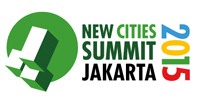 |
2015 New Cities Summit To Be Held In Jakarta Following a rigorous global competition, Jakarta was selected by the New Cities Foundation as host city for the 2015 Summit in order to address specific challenges and opportunities faced by Asian metropolises. The theme for the 2015 New Cities Summit is “Seizing the Urban Moment: Cities at the Heart of Growth and Development”. The celebrated annual event gathers some 800 of the world’s leading decision-makers, mayors, CEOs, entrepreneurs, thinkers, artists and innovators. The New Cities Summit fosters positive urban change through cross-sector network building, cutting-edge forums and action-oriented discussion. Read more here and follow monthly tweet chats here. |
 |
UCLG Advocates for Local Priorities : See #urbanSDG Selfie Campaign and More United Cities and Local Governments (UCLG) and its members continue to advocate for Sustainable Development Goals that take local and regional priorities into account, in particular in the light of rapid urbanization faced in many regions of the world. Therefore, and on the occasion of World Habitat Day 2014, UCLG called upon its members to participate in the #urbanSDG Selfie Campaign, Since then, UCLG has reached more than 250 signatories, initiated two email campaigns UCLG Celebrates Urban October and We celebrate and welcome the first World Cities Day , and has published and shared the following: Local and Regional Governments have a specific goal on #UrbanSDG! , UCLG Celebrates Urban October, Thanks to supporters worldwide for taking action in Urban October! |
 |
Two Recent Reports Confirm Urgency for Global Sustainability 2014 was the hottest year on record according to recent assessments released by both NASA and NOAA. Global temperatures continue to rise. In fact, the ten warmest years on record since 1880 when global monitoring began, all occurred since 1998. For more information see NASA and NOAA.In another recent study, scientists confirm that anthropological activity may cause mass extinctions in our planet’s oceans if current practices continue unabated. Unsustainable practices have negatively impacted marine life both large and small. Repercussions threaten the oceans’ global ecosystems as negative changes are increasing in both “impact and pace”. Read the study here |
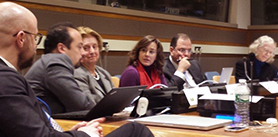 |
UrbanSDG Campaign Partners Collaborate at Stocktaking Side Event The UrbanSDG campaign organised a lunch meeting on the urban goal and accompanying targets during January’s Intergovernmental Negotiations on the Post-2015 Development Agenda Stocktaking Session. Dr. Cynthia Rosenzweig presented key conclusions from the urban group’s Bangalore Meeting, on urban targets and indicators, encouraging Member States to proceed with a ‘target-proofing’ process (as proposed by the SG in his Synthesis report), in order to strengthen and refine the urban targets and accompanying indicators. Dr. Genie Birch (UPenn and TG09 Member), Mr. Andrew Rudd (UNHabitat), Mr. Yunis Arikan (ICLEI) and Ms. Maruxa Cardama (Communitas) also presented, reiterating the need for a strong focus on cities and spatial dimensions across the framework. The Permanent Representative of Brazil and a Minister Counsellor from Singapore (both goal advocates for the urban goal) provided supportive comments. Read more about the IGN Stock-taking session. |
 |
ICLEI World Congress 2015 ICLEI will hold its World Congress 2015, “Sustainable Solutions for an Urban Future” on in Seoul , Republic of Korea this April. Plenary session topics include “Trends, Targets and Solutions for a Sustainable Urban Future”, “Optimizing Urban Partnerships”, and “Translating Sustainable Development Goals to Integrated Local Actions “. Read more |
 |
34 cities to join 100 Resilient Cities Challenge The Rockefeller Foundation recently announced the winners of round two of the 100 Resilient Cities Challenge. Thirty-five cities will receive funding for a chief resiliency officer, to develop a resilience strategy and for assistance with design and implementation. Cities were selected from a pool of 331 applications and will join another 33 resilient cities previously awarded. Both cities in developed and developing countries were awarded including Sydney, Australia, Accra, Ghana and Cali, Colombia. Read More |
 |
Mobilizing Cities Behind the SDGs – The Mayors’ Meet On September 22, 2014, with support from the UrbanSDG campaign, the SDSN held a meeting of mayors, ambassadors, leaders from the private sector and technical experts to discuss the goal on sustainable cities and human settlements proposed by the Open Working Group and how cities can mobilize around this agenda. Mayors from 10 major cities attended with keynotes delivered by Mayor Eduarado Paes of Rio de Janeiro, Mayor Anne Hidalgo of Paris, and Mayor Bill de Blasio of New York. The event was covered in Scientific American and WNYC.Download Event Report |
 |
Communitas Coalition Releases Revised Targets and Indicator Options for the Urban SDG: In July 2014, the Communitas Coalition for Sustainable Cities and Regions produced a Matrix of Targets & Indicators as a practical tool for the final session of the SDGs Open Working Group. The matrix outlines the proposed targets under SDG 11 in rows, as well as the latest iteration of proposals elaborated by the Communitas Secretariat on 3rd June. Each target is correlated with possible indicators. The ultimate objective of the matrix was to show how the inclusion of existing targets under SDG 11 could already address additional areas of particular importance to Sustainable Cities & Human Settlements. |
 |
UrbanSDG Campaign Letter to OWG Co-Chairs: Prior to the UN Open Working Group’s 13th and final session, the #urbanSDG campaign submitted a letter to the OWG co-chairs with proposed adjustments to its goal on sustainable cities. The letter is available for download here. The OWG concluded its final session with 17 proposed goals, including Goal 11: Make Cities and Human Settlements inclusive, safe, resilient and sustainable. The #urbanSDG campaign would like to congratulate the OWG co-chairs for their bold leadership of this process. The inclusion of Goal 11 on sustainable cities and human settlements marks a great step forward in the SDG agenda. |
 |
UrbanSDG Campaign Members Meeting in London to discuss Urban SDG indicators: On 22nd – 24th August 2014, UrbanSDG campaign members and technical experts met at Royal Holloway in London to discuss and refine targets and indicators for the UrbanSDG (OWG Goal 11 on Sustainable Cities and Human Settlements). A summary of this meeting will be available shortly. |
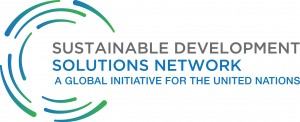 |
SDSN to host High Level event bringing together City Leaders and Ambassadors to the UN: On Monday 22nd September SDSN will host a high level luncheon for Mayors, Permanent Representatives to the United Nations, leaders from the private sector and technical experts to consider the potential offered by an SDG on Sustainable Cities. As recognized by the Open Working Group on Sustainable Development Goals, a dedicated and stand-alone goal on sustainable cities and human settlements is essential to mobilize stakeholders, promoted integrated, city-level approaches, and accelerate progress towards sustainable development, including the end of extreme poverty. The second issue for discussion will be the role that cities can play in helping to implement the whole SDG agenda. The contours of urban economies and societies demand new forms of governance and policy making in comparison to traditional agrarian or mixed societies. Higher population densities require concentrated investments in physical, natural and social infrastructure, careful conservation, restoration and management of ecosystem services and building greater resilience against external shocks. Managing cities with such diversity of size, scope and character requires resilient and innovative institutions, flexible policies and a cadre of interdisciplinary professions with a wide range of skills. Many lessons can be learnt from these new approaches to policy-making and governance, which can guide the implementation of an integrated SDG agenda. For more information on the event and/or media please contact Jessica Espey (jessica.espey@unsdsn.org) |
 |
In a series of new articles Neil Pearce of Citiscope explores the Open Working Group’s recent SDG proposals He examines the crucial role of the UrbanSDG campaign in securing Goal 11, the motivations for including a goal on cities, as well as the transition from MDGs to SDGs.The full articles are available here: |
 |
World Cities Summit Mayors Forum write to OWG in support of Urban SDG Over 112 Mayors and senior local government leaders have written to the Open Working Group co-chairs expressing their support for a standalone Sustainable Development Goal (SDG) focused on Sustainable Cities and Human Settlements, in advance of the World Cities Summit Mayors Forum taking place on 13-15 June, 2014. Read Letter More Information |
 |
UrbanSDG Campaign Writes Open Letter to OWG Co-Chairs on Draft SDGs On 14th July 2014 members of the Campaign for an UrbanSDG sent a letter to the co-chairs of the OWG congratulating them on the inclusion of Goal 11 on Sustainable Cities, reiterating its importance for a successful sustainable development agenda and making suggestions for the consolidation of targets, as the OWG works to streamline the final draft. More Information |
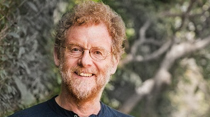 |
Underestimated Urban Poverty Rates A blog by David Satterthwaite at IIED Read blogpost |
 |
Wanted: Urban Data Revolution for Post-2015 Sustainable Development Goals David Satterthwaite highlights the need for more detailed data from urban centers describing the deprivations faced by low-income people. Such data would empower local governments and low income groups to make strategic decisions. Read blogpost |
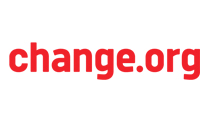 |
Urban Network Starts Petition for an Urban SDG on Change.org City Builders Global Network starts petition on Change.org for individuals to support urban sustainable development goal to “achieve sustainable cities and human settlements.” Sign Petition |
| C40 Mayors Support an Urban SDG Mayors from 41 cities endorsed C40 Chair Eduardo Paes’ letter to the Open Working Group calling for an urban SDG, at the C40 Summit in Johannesburg. Paes argued that an urban SDG would concentrate the world’s attention on the unique challenges cities face in developing sustainably, would help to coordinate efforts to work with cities, and, would reinforce the concept of the SDGs as a global agenda. (March 10, 2014) More Information |
|
 |
German Government Proposes Urban SDG The German government released its key positions on the post-2015 development agenda. The document proposes 13 sustainable development goals, including one to “ensure that urbanization is sustainable.” (March 4, 2014) |
 |
Communitas Coalition Releases First Draft Targets for Urban SDG The Communitas Coalition for Sustainable Cities and Regions released 14 draft targets for an SDG on Urbanization and Human Settlements. The targets fall under five “cluster” areas: fundamental urban patterns, urban life of dignity for all, governance and accountability, enabling policies, and territorial dimension of other SDG areas. (February 24, 2014) |
 |
Communitas Coalition Releases Final Issues Papers on Sustainable Urbanization Final issues papers were released by Communitas Coalition. The papers were prepared by six expert and practitioner-led workgroups tasked with setting the overall targets for just, prosperous, and sustainable urbanization. (January 10, 2014) |
| Cities Alliance Sends Letter to Open Working Group in Support of Urban SDG Billy Cobbett, Director of Cities Alliance, sent a letter to the OWG co-chairs supporting a specific urban goal within the SDGs, stating that “history has shown that cities have a proven track record as extremely effective vehicles for reducing poverty over the long term – not just in urban areas, but also in rural areas. (January 7, 2014) Read full text of letter |
|
 |
Habitat for Humanity supports the United Nations discussion of sustainable cities Habitat for Humanity International supports the efforts of the Open Working Group and its focus on sustainable cities and human settlements. (January 7, 2014) Read entire statement |
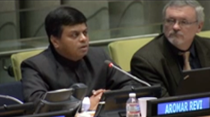 |
Aromar Revi Presents on Urban SDG to OWG7 Aromar Revi presented on “Why the World Needs an Urban SDG?” to the 7th session of the UN General Assembly’s Open Working Group on Sustainable Development Goals, and responded to questions from UN member states. (January 7, 2014) See more |
 |
C40 Chair Sends Letter of Support for Urban SDG Eduardo Paes, Mayor of Rio de Janeiro and newly inaugurated chair of C40, sent a letter to the OWG co-chairs in support of an urban SDG. In his letter, the mayor stated that “the concentration of people in a small area gives the challenges of sustainable urbanism special, and critical, needs that must be acknowledged by the SDGs” and that “without an urban goal the SDGs will be incomplete.” C40 is a network of the world’s megacities taking action to reduce greenhouse gas emissions. (January 2, 2014) For the full letter, click here |
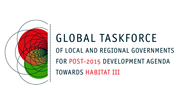 |
Global Task Force Presents Secretary General with 157 Signatories for Standalone Urban Goal (December 12)
On December 12, during the Sustainable Cities Days at the United Nations, Secretary General Ban Ki-moon met with members and partners of the Global Taskforce of Local and Regional Governments for Post-2015 Development Agenda Towards Habitat III at a special session. The group presented the Secretary General with 157 forms signed by mayors, governors, and their associations and civil society partners calling for an Urban SDG to be included in the new development agenda.
|
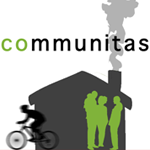 |
Urban Goals, Targets, and Indicators Discussed at Communitas Workshop (December 5-6) The Experts Workshop on Sustainable Cities and Human Settlements was organized by Communitas Coalition on December 5 and 6 to enable governments to discuss informally with experts, major groups, stakeholders, and UN agencies the issue of sustainable urbanization in the future sustainable development goal (SDG) framework and UN development agenda. Participants discussed potential urban goals, targets, and indicators, with Dr. Cynthia Rosenszweig of the Sustainable Development Solutions Network arguing that only a stand-alone, dedicated urban SDG can mobilize and empower all urban actors to address the specific challenges of urban sustainable development. The meeting outcomes were included in 6 concept papers to be submitted to the Open Working Group for its session on Sustainable Cities in January 2014. |
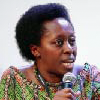 |
Urbanization: An Emerging Topic at European Development Days 2013 (December 2, 2013). Read article |
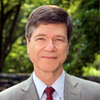 |
Jeff Sachs argues that urban areas must lead the way toward environmentally healthy and socially inclusive economies (November 25, 2013). Read article |
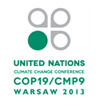 |
Secretary General Ban Ki-moon delivers remarks on “Cities and the Sub-National Dialogue” during “Cities Day” at UN Warsaw Climate Conference (COP19) in Warsaw, Poland (November 21, 2013). Read remarks |
 |
Matthew Lynch of WBCSD asks “Does the World Need an Urban Sustainable Development Goal (SDG)?” (October 23, 2013). Read blog post |
 |
Dan Petrie of Habitat for Humanity asks, “Where do Sustainable Cities Fit?” (October 14, 2013). Read blog post |
